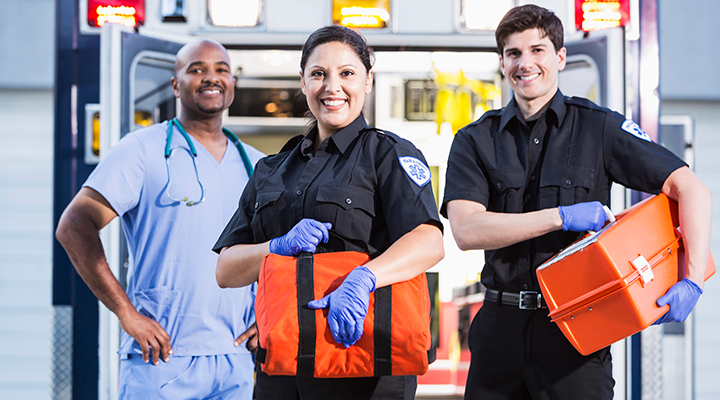| |
Aug 25, 2025
|
|
|
|
|
2024-2025 Catalog
Paramedic, AAS
|
|
 Return to: Programs of Study by Department Return to: Programs of Study by Department
Award: Associate of Applied Science
Degree Code: EMTR
Number of Credits: 60

Program Description
The Paramedic is an allied health professional whose primary focus is to provide advanced emergency medical care for critical and emergent patients who access the emergency medical system. This individual possesses the complex knowledge and skills necessary to provide patient care and transportation. Paramedics function as part of a comprehensive EMS response, under medical oversight. The Paramedic program in Cecil County contains 720 contact hours of theoretical and clinical instruction, resulting in eligibility to sit for the paramedic exam. Students who wish to continue their education and work towards an Associate of Applied Science degree and who have current, unencumbered paramedic certification may be able to receive credits for the EMT courses through credential assessment.
Transfer Information
Cecil College has the following transfer agreements: https://www.cecil.edu/student-resources/advising-transfer/transfer-agreements. Additionally, transfer information is available at the ARTSYS website (The Articulation System of Maryland). Contact your advisor for detailed information.
|
General Education and Program Requirements
General Education and Program Requirements - Select 1 Credits
Please see Academic Advisor for elective selection. - ELECT - Elective - 1 Credit
Requirement of Major (28 Credits)
- Paramedic - Preparatory Knowledge - 5 Credits (Fall)
- Paramedic - Patient Assessment - 3 Credits (Fall)
- Paramedic - Traumatic Emergencies - 5 Credits (Spring)
- Paramedic - Medical Emergencies - 5 Credits (Fall)
- Paramedic - Special Considerations - 4 Credits (Spring)
- Paramedic - Operations - 3 Credits (Spring)
- Paramedic - Clinical /Field Requirements - 3 Credits (Summer)
Recommended Sequence
The following is a recommended sequence of courses for completing this program as a full-time student. Developmental and prerequisite course requirements, credit load, and/or course availability may affect a student’s individual progress. Students should consult their degree audit at MyCecil or an academic advisor for individual degree planning. Program Learning Outcomes
Upon successful completion of this program, students will meet the General Education Student Learning Outcomes and be able to: - Demonstrate the ability to assign priority levels of emergency treatment to patients and effectively perform all basic and advanced interventions as part of a treatment plan intended to mitigate the emergency, provide symptom relief, and improve overall health of the patient and evaluate the plan and treatment and disposition of the patient accordingly.
- To function as a team leader of a routine, single patient advanced life support call.
- Perform in cooperation with medical direction, the need for emergency medical care including the recognition of life-threatening disorders such as airway and respiratory problems, cardiac dysrhythmias, traumatic injuries, and mental health emergencies, to an appropriate care facility by the most effective means of transportation.
- Demonstrate with proficiency the management of cardiac arrest and peri-arrest states and apply comprehensive knowledge of the causes and pathophysiology into the management of shock, respiratory failure or arrest with an emphasis on early intervention to prevent cardiac arrest.
- Communicate effectively, professionally and in a culturally sensitive manner, with patients, colleagues and other health care professionals, in all written and oral communications.
- Perform with safety and efficiency all psychomotor skills in accordance with the National EMS Scope of Practice and the State of Maryland Scope of Practice at the paramedic level.
- Perform and direct routine maintenance and preparation of emergency care equipment and supplies at the beginning and end of each shift and after every response.
|
 Return to: Programs of Study by Department Return to: Programs of Study by Department
|
|